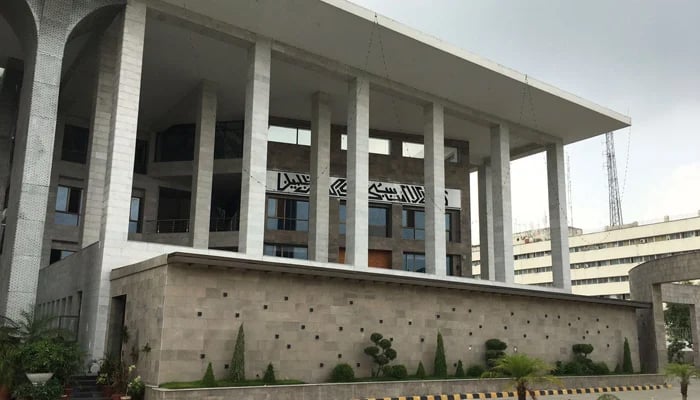Missing persons cases matter of embarrassment: IHC
Faisal Siddiqui, Advocate, said he submitted his comments in written form in which he raised six questions
ISLAMABAD: The Islamabad High Court (IHC) on Thursday summoned the attorney general to the next hearing for assistance in cases concerning the recovery of missing people. A division bench — comprising Chief Justice Aamer Farooq and Justice Miangul Hassan Aurangzeb — heard a set of identical petitions for the recovery of missing people, including a journalist Mudasir Naro. The court also sought arguments from amicus curiae Faisal Siddiqui in the next hearing.
At the outset of the hearing, the additional attorney general said a committee had been formed to address this case, adding that serious efforts were being made in this regard. The chief justice remarked the petitions have been pending for the last five years, adding that they feel embarrassed now.
Faisal Siddiqui, Advocate, said that he had submitted his comments in written form in which he had raised six questions. He said the courts shouldn’t tolerate such practice.
Justice Miangul Hassan said the protection of people should be the priority of the state. He said the court couldn’t forget the missing persons as these were extraordinary incidents.
He remarked that the court was issuing directions repeatedly but these were not being implemented and the people remained missing.
Justice Miangul Hassan instructed the attorney general to present the progress report at the next hearing after meeting with the prime minister. The chief justice remarked that the incidents of disappearances of citizens were damaging the repute of the country and practical steps were required to stop such practice. Further hearing of the case was then adjourned for two weeks.
-
 King Hospitalized In Spain, Royal Family Confirms
King Hospitalized In Spain, Royal Family Confirms -
 Japan Launches AI Robot Monk To Offer Spiritual Guidance
Japan Launches AI Robot Monk To Offer Spiritual Guidance -
 Japan Plans Missile Deployment Near Taiwan By 2031 Amid Growing Regional Tensions
Japan Plans Missile Deployment Near Taiwan By 2031 Amid Growing Regional Tensions -
 Meghan Markle, Prince Harry Spark Reactions With Latest Announcement
Meghan Markle, Prince Harry Spark Reactions With Latest Announcement -
 Kate Hudson Reflects On Handling Award Season With No Expectations
Kate Hudson Reflects On Handling Award Season With No Expectations -
 6 Celebrities Who Have Been Vocal About Anxiety And 'panic Attacks'
6 Celebrities Who Have Been Vocal About Anxiety And 'panic Attacks' -
 Is This The Future Of Train Travel? Robot Dogs, Drones Are Redefining Public Transit Safety Through China’s New Metro Station Deployment
Is This The Future Of Train Travel? Robot Dogs, Drones Are Redefining Public Transit Safety Through China’s New Metro Station Deployment -
 Sarah Ferguson Seeks Hollywood Backing As Epstein Files Resurface
Sarah Ferguson Seeks Hollywood Backing As Epstein Files Resurface -
 China’s AI Milestone: ByteDance’s Doubao Chatbot Hits 100M Users During Lunar New Year
China’s AI Milestone: ByteDance’s Doubao Chatbot Hits 100M Users During Lunar New Year -
 Think You Know ChatGPT? Here Are 5 AI Levels You’ve Never Seen
Think You Know ChatGPT? Here Are 5 AI Levels You’ve Never Seen -
 Bitcoin Bounces From $62,000 As On-chain Metrics Signal Prolonged Weakness: Here Is Everything To Know
Bitcoin Bounces From $62,000 As On-chain Metrics Signal Prolonged Weakness: Here Is Everything To Know -
 Elon Musk Teases Official Grok CLI For Developers As AI Rivalry With Anthropic Heats Up
Elon Musk Teases Official Grok CLI For Developers As AI Rivalry With Anthropic Heats Up -
 Jennifer Aniston Ready To Walk Down The Aisle Again?
Jennifer Aniston Ready To Walk Down The Aisle Again? -
 Sarah Ferguson’s Plan Now That Andrew Is Thrown Into The Fire: ‘She’s Not Certain She’ll Come Out The Other Side’
Sarah Ferguson’s Plan Now That Andrew Is Thrown Into The Fire: ‘She’s Not Certain She’ll Come Out The Other Side’ -
 ‘The AI Doc’: What AI Leaders Told Daniel Roher Will Keep You Up At Night
‘The AI Doc’: What AI Leaders Told Daniel Roher Will Keep You Up At Night -
 Sarah Ferguson In Hiding As Arrest Fears Grow After Andrew Was Taken Into Custody
Sarah Ferguson In Hiding As Arrest Fears Grow After Andrew Was Taken Into Custody




